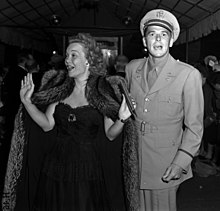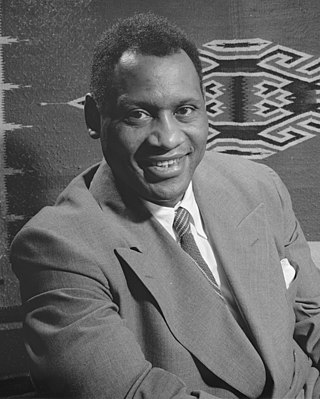
Paul Leroy Robeson was an American bass-baritone concert artist, actor, professional football player, and activist who became famous both for his cultural accomplishments and for his political stances.
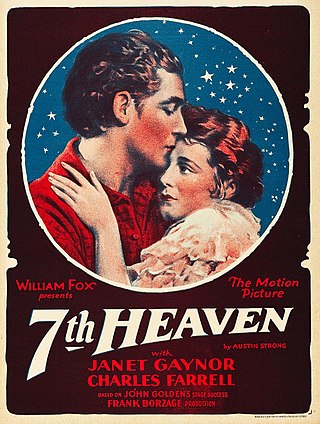
7th Heaven is a 1927 American synchronized sound romantic drama directed by Frank Borzage, and starring Janet Gaynor and Charles Farrell. While the film has no audible dialog, it was released with a synchronized musical score with sound effects using the Movietone sound system. The film is based upon the 1922 play Seventh Heaven, by Austin Strong and was adapted for the screen by Benjamin Glazer. 7th Heaven was initially released as a standard silent film in May 1927. On September 10, 1927, Fox Film Corporation re-released the film with a synchronized Movietone soundtrack with a musical score and sound effects.

Harry Belafonte was an American singer, actor, and civil rights activist who popularized calypso music with international audiences in the 1950s and 1960s. Belafonte's career breakthrough album Calypso (1956) was the first million-selling LP by a single artist.

Richard Horatio Edgar Wallace was a British writer of sensational detective, gangster, adventure, and sci-fi novels, plays and stories.

Manhattan Murder Mystery is a 1993 American black comedy mystery film directed by Woody Allen, which he wrote with Marshall Brickman, and starring Allen, Alan Alda, Anjelica Huston, and Diane Keaton. The film centers on a married couple's investigation of the death of their neighbor's wife.
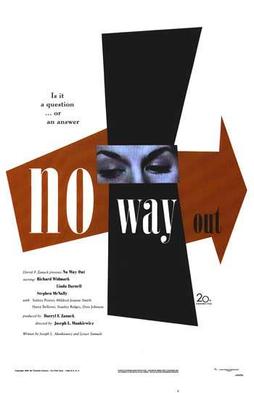
No Way Out is a 1950 American crime drama film noir directed by Joseph L. Mankiewicz and starring Sidney Poitier in his film debut, alongside Richard Widmark, Linda Darnell and Stephen McNally. The film centers on an African American doctor who confronts the racism of a poor slum after he treats a racist white criminal.
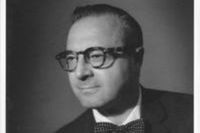
Stanley David Levison was an American businessman and lawyer who became a lifelong activist in socialist causes. He is best known as an advisor to and close friend of Martin Luther King Jr., for whom he helped write speeches, raise funds, and organize events.

The Kaufman Astoria Studios is a film studio located in the Astoria neighborhood of Queens in New York City. The studio was constructed for Famous Players–Lasky in 1920, since it was close to Manhattan's Theater District. The property was taken over by real estate developer George S. Kaufman in 1982 and renamed Kaufman Astoria Studios.

Watchmen is a 2009 American superhero film based on the 1986–1987 DC Comics limited series of the same name co-created and illustrated by Dave Gibbons. Directed by Zack Snyder from a screenplay by David Hayter and Alex Tse, the film features Malin Åkerman, Billy Crudup, Matthew Goode, Carla Gugino, Jackie Earle Haley, Jeffrey Dean Morgan, and Patrick Wilson. A dark and dystopian deconstruction of the superhero genre, the film is set in an alternate history in the year 1985 at the height of the Cold War, as a group of mostly retired American superheroes investigate the murder of one of their own before uncovering an elaborate and deadly conspiracy with which they are all connected.

Bathing Beauty is a 1944 American musical romantic comedy film directed by George Sidney, and starring Red Skelton and Esther Williams.

American poet and short story writer Edgar Allan Poe has had significant influence in television and film. Many are adaptations of Poe's work, others merely reference it.
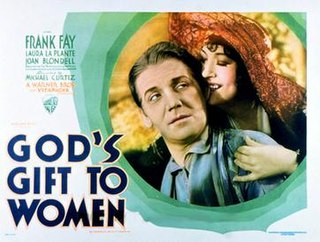
God's Gift to Women is a 1931 American pre-Code romantic musical comedy film directed by Michael Curtiz, starring Frank Fay, Laura LaPlante, and Joan Blondell. The film, based on the play The Devil Was Sick by Jane Hinton, was originally completed as a musical film; however, because of audience dislike for musicals at that time, all the songs were cut in American prints. The full film was released intact in other countries, where there was no such decline in popularity.

Sanders of the River is a 1935 British film directed by the Hungarian-British director, Zoltán Korda, based on the stories of Edgar Wallace. It is set in Colonial Nigeria. The lead Nigerian characters were played by African Americans Paul Robeson and Nina Mae McKinney. The film proved a significant commercial and critical success, giving Korda the first of his four nominations for Best Film at the Venice Film Festival.
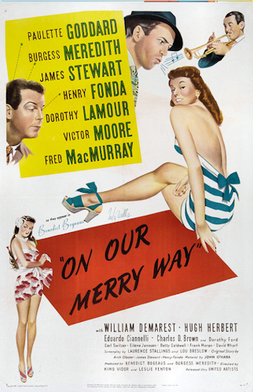
On Our Merry Way is a 1948 American comedy film produced by Benedict Bogeaus and Burgess Meredith and released by United Artists. At the time of its release, King Vidor and Leslie Fenton were credited with its direction, although the DVD lists John Huston and George Stevens, who assisted with one of the segments, as well. The screenplay by Laurence Stallings and Lou Breslow, based on an original story by Arch Oboler, is similar in style to that of Tales of Manhattan (1942), another anthology film made up of several vignettes linked by a single theme. The picture stars Paulette Goddard, Burgess Meredith, James Stewart, Henry Fonda, Harry James, Dorothy Lamour, Victor Moore and Fred MacMurray. It marks the first joint movie appearance of Stewart and Fonda, who play a pair of musicians in their section of the film.
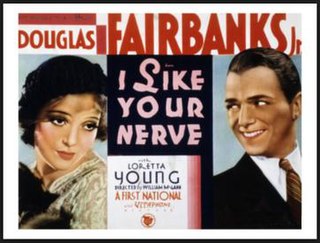
I Like Your Nerve is a 1931 American pre-Code romantic comedy film directed by William C. McGann, starring Douglas Fairbanks, Jr. and Loretta Young. Boris Karloff has a small role.

When's Your Birthday? is a 1937 American romantic comedy film directed by Harry Beaumont and starring Joe E. Brown. While original prints of this film had a cartoon sequence in Technicolor directed by Bob Clampett and Leon Schlesinger, most surviving prints have the sequence in black-and-white.
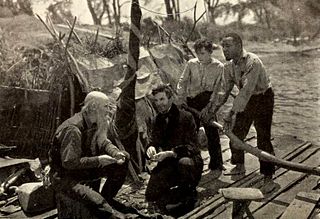
George H. Reed (1866-1952) was an American actor working in the Hollywood film industry in both the silent and sound eras. His first major film was the 1920 Huckleberry Finn where he played Jim. He is also remembered for the film The Green Pastures (1936), which featured an all–African American cast, and the orderly Conover in MGM's Dr. Kildare series.
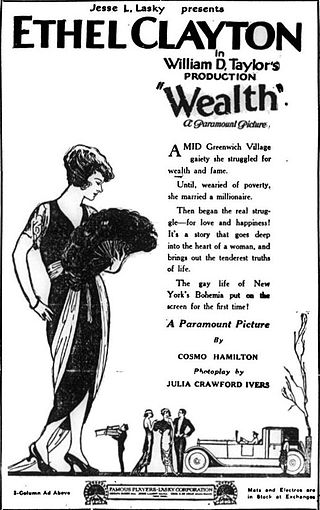
Wealth is a 1921 American silent drama film directed by William Desmond Taylor, written by Cosmo Hamilton and Julia Crawford Ivers, and starring Ethel Clayton, Herbert Rawlinson, J.M. Dumont, Larry Steers, George Periolat, and Claire McDowell. It was released on August 21, 1921, by Paramount Pictures. It is not known whether the film currently survives, and it may be a lost film.

Manhattan Heartbeat is a 1940 American drama film directed by David Burton and written by Clark Andrews, Harold Buchman, Jack Jungmeyer and Edith Skouras. It is based on the 1928 novel Bad Girl by Viña Delmar. The film stars Robert Sterling, Virginia Gilmore, Joan Davis, Edmund MacDonald, Don Beddoe and Paul Harvey. The film was released on July 12, 1940, by 20th Century Fox.

Call It Luck is a 1934 American comedy film directed by James Tinling and written by Dudley Nichols and Lamar Trotti. The film stars Pat Paterson, Herbert Mundin and Charles Starrett. The film was released on June 1, 1934, by Fox Film Corporation. A review in Variety concluded that "Herbert Mundin steals the picture despite that Pat Paterson, whom Fox is trying to build up, is given every opportunity to snatch attention".

